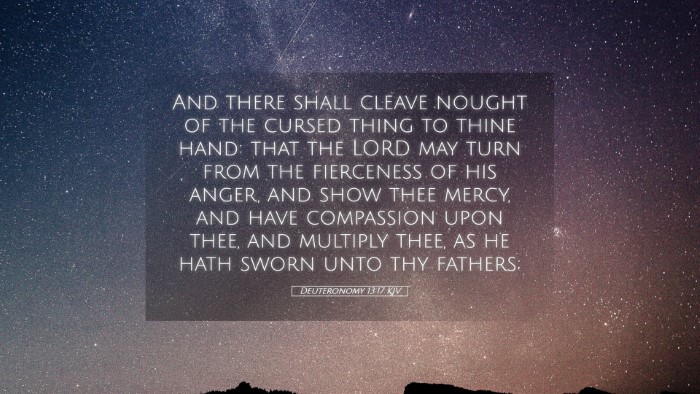Bible Commentary on Deuteronomy 13:17
Verse Text: "And there shall cleave nought of the cursed thing to thine hand: that the LORD may turn from the fierceness of his anger, and shew thee mercy, and have compassion upon thee, and multiply thee, as he hath sworn unto thy fathers."
Introduction
The passage found in Deuteronomy 13:17 serves as a critical admonition to the Israelites regarding the consequences of idolatry and the importance of adherence to God's commandments. This commentary synthesizes insights from prominent public domain scholars such as Matthew Henry, Albert Barnes, and Adam Clarke to provide a comprehensive understanding of the text.
Contextual Background
Deuteronomy is a reiteration of the Law delivered by Moses to the Israelites as they prepared to enter the Promised Land. This chapter specifically addresses the dangers of apostasy and idolatry, warning the people against any form of religious deviation. Such deviations, if tolerated, could lead to dire consequences including divine wrath and judgment.
Commentary Insights
Matthew Henry's Commentary
Divine Judgment: Henry emphasizes that the "cursed thing" refers to anything devoted to destruction due to its association with idolatry. He articulates that unrepentant adherence to such cursed items could invoke God’s fierce anger. Moreover, it acts as a reminder that nothing associated with sin should cling to the Israelites. The passage serves as a counsel against the entanglement with sinful practices that could lead to collective punishment.
Albert Barnes' Notes
Separation from Idolatry: Barnes highlights that the call for the Israelites to avoid any cursed thing signifies a broader principle of spiritual and moral separation. He interprets the phrase "there shall cleave nought" as instruction that the community of God must remain pure, free from the contamination of surrounding pagan customs. Ultimately, he underscores that liberty from judgment and the blessing of mercy are contingent upon obedience to God's commands.
Adam Clarke's Commentary
Conditions for Mercy: Clarke presents a detailed exposition on how divine compassion is contingent upon human obedience. He outlines that God’s mercy has conditions, especially concerning sin. The phrase "that the LORD may turn from the fierceness of his anger" speaks to the covenantal relationship between God and His people. Clarke elucidates that the blessings promised are directly tied to the avoidance of sin and the loyalty to God’s commandments, further illustrating the nature of God’s mercy in relation to His justice.
Theological Implications
This verse poses significant theological considerations regarding the nature of God’s justice and mercy. It draws attention to the serious consequences of sin and the divine desire for repentance and restoration. Key implications include:
- Righteousness of God: The verse reaffirms God’s righteousness, showcasing that His judgments are just and are a response to disobedience.
- Conditional Mercy: It illustrates that God's mercy is not arbitrary but is conditioned upon human obedience and faithfulness.
- Corporate Responsibility: The nature of covenantal relationships is communal, suggesting that the sins of individuals can invoke consequences for the entire community.
Practical Applications
For pastors, students, and theologians, Deuteronomy 13:17 invites reflection on several practical areas:
- Encouragement of Holiness: The pursuit of holiness should be a priority within congregational life; individual actions carry communal significance.
- Teaching on Idolatry: Contemporary forms of idolatry need to be identified and addressed within church teachings. This includes materialism, secularism, and spiritual complacency.
- Promoting a Culture of Repentance: The necessity of repentance in maintaining a relationship with God, highlighting the importance of turning away from sinful behaviors.
- Awareness of God’s Discipline: Understanding that God’s disciplinary actions are rooted in love and aimed at restoring His people to a state of right relationship with Him.
Conclusion
Deuteronomy 13:17 serves as a profound reminder of the serious nature of idolatry and the grave consequences it incurs. The syntheses of insights from Matthew Henry, Albert Barnes, and Adam Clarke collectively illuminate the need for adherence to God’s commandments and the communal responsibility of maintaining holiness. This exhortation not only holds historical relevance but also echoes in contemporary faith practices, reminding us of the delicate balance between judgment and mercy in the divine character.


